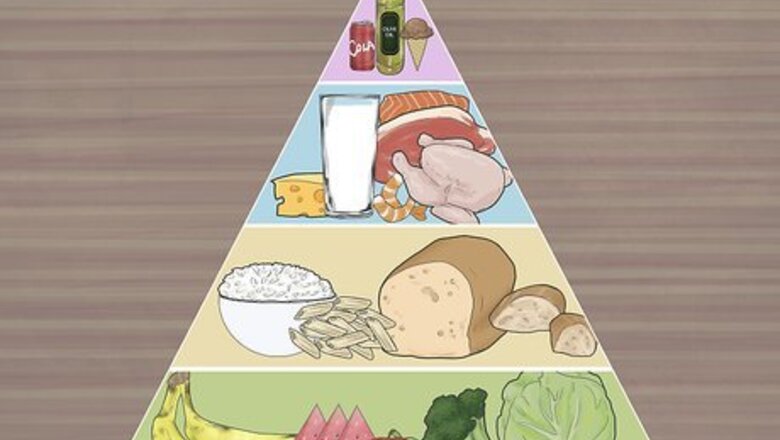
views
Healthy Dietary Choices
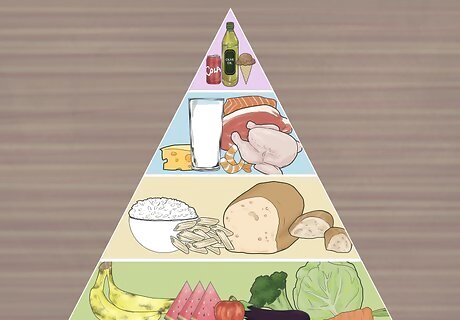
Follow a balanced diet rich in fruits, vegetables, and lean proteins. Healthier diets are overall better for your mental health than unhealthy ones. In general, stick with a well-balanced diet that provides you with plenty of vitamins and nutrients, and one that’s low in saturated fats and unhealthy ingredients. A plant-based diet with lean proteins, whole grains, and healthy fat sources is best. You should have at least 4 fruit and 6 vegetable servings each day. Try to include a few of each in every meal. Try to get your protein from lean meats or plants. Good choices include poultry, fish, beans, soy, nuts, and legumes.
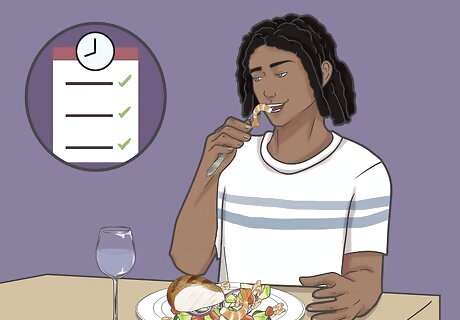
Eat on a consistent schedule to keep your blood sugar regulated. Blood sugar crashes can depress your mood and make your anxiety worse. Try to eat at the same times each day so your blood sugar and mood stay consistent. Make sure you don’t skip any meals either. If you’re usually on-the-go and can’t always sit down to eat, try planning ahead and packing some snacks with you.
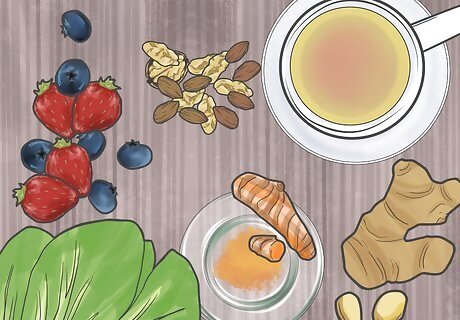
Boost your antioxidant levels. There's evidence that a lack of antioxidants could make anxiety worse, so try to eat foods high in these nutrients. Good sources include fruits, beans, berries, nuts, and leafy green vegetables. Include some of these foods in each meal you eat. Some spices and herbs like oregano, turmeric, ginger, and tea also contain antioxidants. There are also antioxidant supplements, but research doesn't show that these are effective. It's best to get all of the antioxidants you need from your regular diet.

Include protein in your breakfast to keep yourself full. Your body is starved of nutrients in the morning, so it’s important to start your day off with a protein boost. This keeps you feeling full and your blood sugar high until lunchtime, which prevents a mood crash early in the day. Good sources of protein in the morning include eggs, turkey, milk, cheese, yogurt, and cottage cheese.
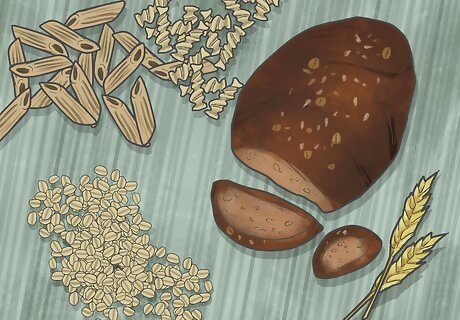
Switch to whole-wheat products for complex carbs. Simple carbs from refined flour or sugar break down quickly, giving you a quick energy boost followed by a crash. Complex carbs break down slower, giving you sustained energy without a mood crash. Try replacing all of the white and enriched products you eat, like bread or pasta, with whole-wheat types instead. Legumes, nuts, and squash are also good sources of complex carbs.

Get at least 2.4 mcg of vitamin B12 each day. Some studies show that a vitamin B12 deficiency could make anxiety and other mental health issues worse. Try to get 2.4 mcg per day to prevent any deficiencies. Fish, shellfish, and red meat are high in vitamin B12. You can also get it from dairy and eggs. B12 deficiencies are rare in healthy people who follow a healthy diet, so you might not need to change your diet to get more than usual.
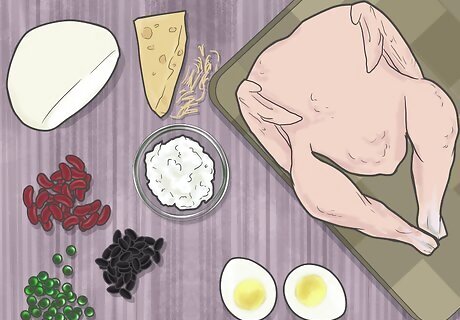
Have more foods rich in tryptophan to calm your mood. Tryptophan has a calming effect on your body and could reduce your anxiety. Try to have 1-2 servings of tryptophan-rich foods during the day to increase your relaxation. Good sources of tryptophan include turkey, eggs, tofu, fish, legumes, and dairy. It has a better effect if you eat it in the morning with breakfast.
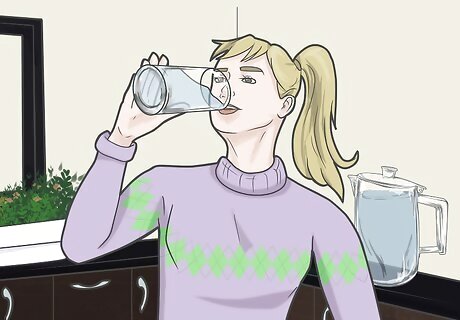
Drink plenty of water to stay hydrated. Dehydration can crash your mood and make your anxiety worse. Always drink plenty of water each day to stay hydrated. Try to drink 8 glasses of water per day. If you feel thirsty or your urine is dark yellow, then drink more water, even if you’ve already had 8 glasses. Sometimes you need more if you’re exercising or it’s hot out.
Foods to Avoid
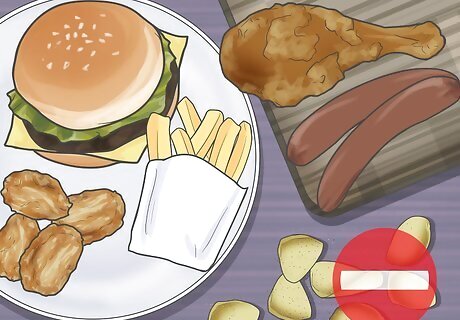
Eat fewer fatty, processed, and fried foods. Foods high in saturated fat tend to make anxiety and depression worse, as well as endanger your physical health. Reduce the number of fatty, processed, and fried foods in your diet. Replace them with healthy, balanced meals instead. Try to replace high-saturated fat foods with unsaturated ones instead. For example, use olive oil instead of butter or margarine when you cook. You should keep your total fat intake below 35% of your total calories. So, if you have 2,000 calories per day, no more than 700 should come from fat. This includes healthy fats as well.
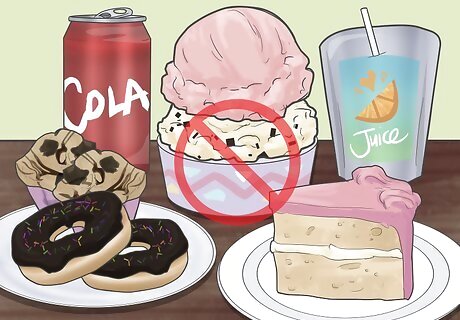
Cut out as much added sugar as you can. Sugar gives you a quick energy spike that could make your anxiety worse, and also a following crash that could make you feel depressed. Try to have less dessert, candy, soda, and other sugary items in your everyday diet. Get into the habit of checking the nutrition labels on everything you buy and looking for added sugars. You might be surprised by how much sugar some foods contain. If you want something sweet, you can have fresh fruit or sugar-free desserts. There are also natural sugars, like the ones in fruit. You don’t have to limit these.
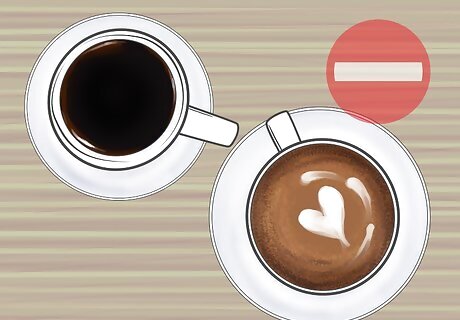
Reduce your caffeine intake to keep your heart rate down. High caffeine levels raise your heart rate, which can make your anxiety worse. Only drink a low or moderate amount of caffeine each day to prevent yourself from feeling jittery and anxious. Caffeine is safe in levels up to 400 mg per day, or about 4-5 cups of coffee. If you have anxiety, then stay well below that maximum. If you’re especially sensitive to caffeine, you may want to cut it out altogether.
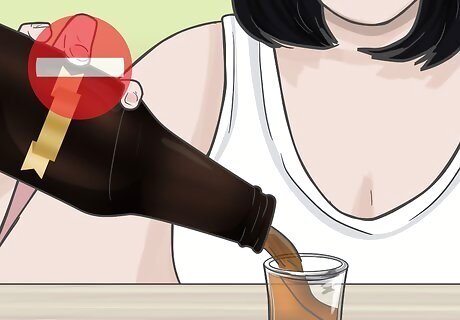
Drink alcohol in moderation. While you might feel like alcohol calms you down, after you body breaks it down your heart rate and anxiety could rise. It’s best to avoid heavy drinking. Stick with an average of 1-2 alcoholic drinks per day. Like with caffeine, this is unique to each person. If you’re sensitive to alcohol and it often raises your anxiety, then you should cut it out altogether.
Herbs and Supplements That Might Help
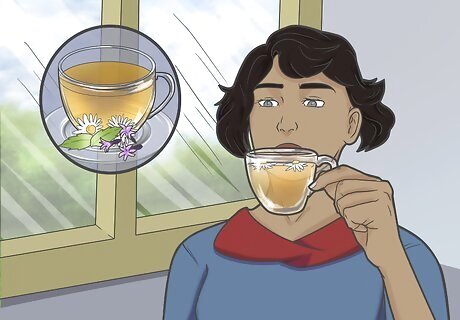
Sip herbal tea to calm yourself down. Some herbs are associated with reduced anxiety and might help keep you relaxed. Try having a few cups of herbal tea each day to see if it helps you feel better. Herbs that are most successful for anxiety include chamomile, valerian root, passionflower, and lavender. Herbal teas are naturally decaffeinated, so they shouldn’t make you jittery. Green or black teas, however, do have caffeine, so make sure you don’t drink too much of these types. There generally isn't an upper limit for how much herbal tea you can drink per day. Common recommendations are 3-5 cups per day. If you feel jittery or use the bathroom too often, since tea is a diuretic, then cut back a bit.
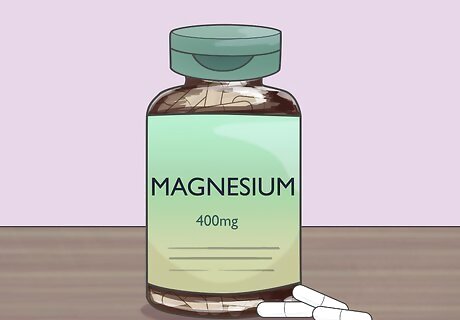
Try magnesium supplements to boost your mood. Some research suggests that a magnesium deficiency can also make anxiety worse. If you don’t get enough from your regular diet, then try a supplement to increase your daily intake. Men only need 420 mg and women need 320 mg each day. Ask your doctor before taking more than this in a supplement.
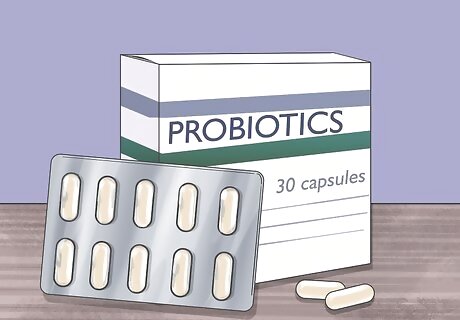
Support your gut health with probiotics. Your digestive health might have a big impact on your mental health. If your gut bacteria are out of balance, you might have digestive problems and other health issues. Try taking a probiotic supplement to boost the amount of healthy bacteria in your gut and see if this helps you. Try to find a particular brand that's been studied. These are most likely to be effective. Common side effects from probiotics are gas, bloating, and minor diarrhea. This should pass in a few days when your body gets used to it. A standard probiotic dose is 10 billion units per day. This sounds like a lot, but each capsule contains several billion units.















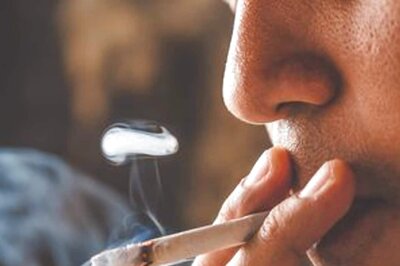



Comments
0 comment